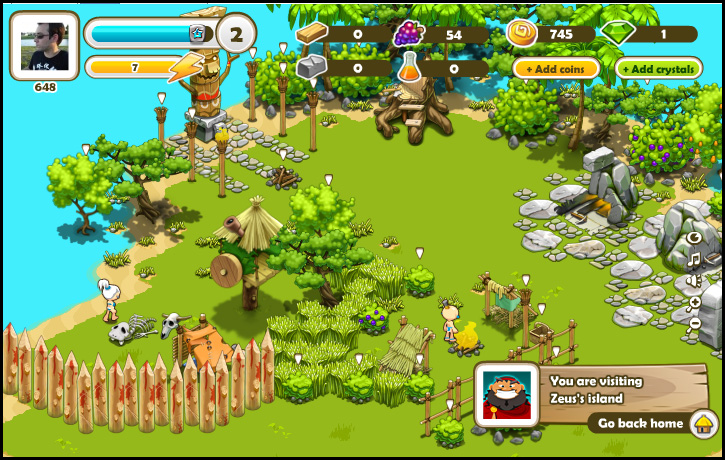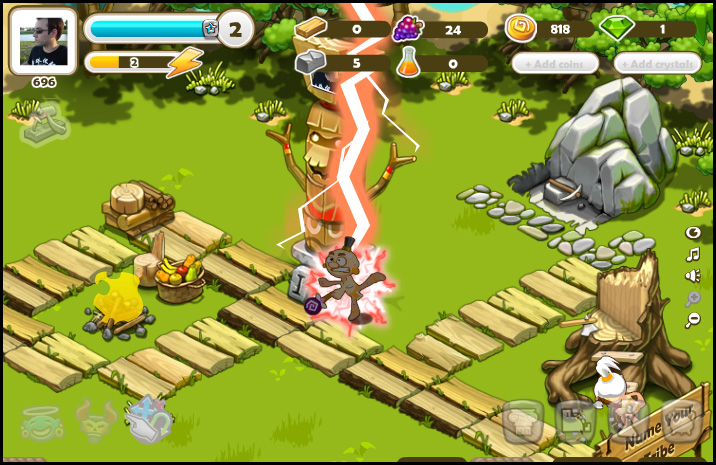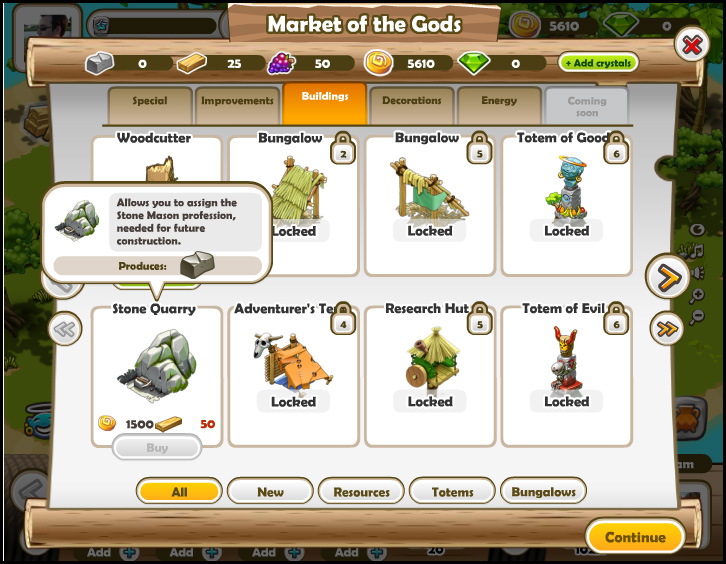社交游戏公司Digital Chocolate发布又一新作Island God
继发布两款Millionaire City翻版游戏Hollywood City和Vegas City后,昨天社交游戏开发公司Digital Cholocate又发布了一款全新的原创游戏Island God。在这款类似于老牌黑白电影主题的游戏中,玩家将扮演一位迷失于茫茫海岛的人类神明。乍一看Island God很像是Facebook版的GodFinger游戏,但体验过后,该游戏又有其独特之处。游戏刚开始是一组部落居民被大风暴吹散到各种海岛上。玩家作为某个海岛的神明掌管着岛上的各种审讯,苦难和权力。
除了拥有神力外,玩家作为Island God需要管理金钱、食物、木材、石料和科学等各种资源。在经过一系列的指导性任务后玩家开始打造自己的岛屿社会。玩家可以点击村民并将他们放到某个岗位上进行各种任务。
游戏中各种不同的场所会产出不同形式的货币。获得石料需要有采石场,木材需要有樵夫,金钱则来自于图腾崇拜。在每个地点都可以进行各种时长的工作获得资源,耗时从3分钟到一天不等。工作时间越长,获得的资源也就越多。其中,石料、木材和金钱这三种资源是玩家建造各种建筑所必须的材料。
游戏中,玩家作为岛屿之神拥有特别的神力,使用神迹就需要消耗一定的神力,神力会随着时间慢慢恢复。玩家的等级越高,神力也就越多。运用神力,玩家可以提早结束村民的工作,但工作时长不同消耗的神力也不同。譬如1点魔力可以结束时长3分钟的工作任务,却可以将8小时的工作缩短30分钟。
除了加快任务完成外,神力还可以用来清除树木,杂草或生物等。另外有趣的是玩家可以使用两种方法使用神力:祈祷或重击(Smite)。尽管两者的效果一致,但前者代表善良而后者则代表邪恶。除了视觉效果不同以外,两者的主要区别在于连续使用这些方法的话会影响玩家的道德,这将在排行版上公布出来。由于目前我的等级太低还看不出差别,但据公司称选则择善良或邪恶的神力使用方法将在对以后岛屿的外观产生一定影响。
另外游戏中还有火焰,食物篮,火炬等多种装饰性道具,玩家如果装满或点燃这些道具的话还可以赚的额外的经验或者食物。在游戏中,食物的功用很大,可以作为货币购买“贡品”用于回复部分神力。
游戏中另一大资源就是科学。玩家达到某一等级后可以建造“神秘小屋”。在小屋中,玩家可以对各种工具进行研究。一旦研究成功,村民在使用该工具进行开采时就可以增加产量。此外小屋还可以研究图腾等建筑,增加岛屿的资源产量。当然游戏中最重要的资源还有村民,可以通过民宅生成。此外,由于岛屿的空间有限,玩家必须要掌握好建造建筑的建造组成。
社交元素方面,该游戏具有最基础的排行榜、赠礼和访问朋友功能。玩家可以帮助打理朋友的海岛,每天还可以使用5点神力激活各种装饰类道具获得额外的食物或经验,如火炬等。
而游戏的不足之处主要是在邀请朋友加入时有点垃圾邮件,有时候会弹出窗口,有时则每间隔60秒弹出一次。在我们刚接触Island God时,它给人的第一印象很像ngcomo的GodFinger,但其中的道德概念则是Digital Chocolate的开发。
总之,Island God是Digital Chocolate公司的又一力作。即便如此,Millionaire City现有的1200万月活跃用户可能也难以满足Digital Cholocate公司连续发布的三部游戏。但由于其他两款游戏Hollywood City和Vegas City与Millionaire City十分相似,玩家可能会更钟意转新理念的Island God。(本文为游戏邦/gamerboom.com编译,转载请注明来源:游戏邦)
While Digital Chocolate’s has recently released two Millionaire City reskins, Hollywood City and Vegas City, it has another new title that’s completely original. The new game is Island God, which follows a Black and White-style premise in having players become the deity of humans lost in the middle of the ocean.
With a quaint style and a curious morality system, Island God is certainly a high quality social game. It does give off the impression, early on, of being a Facebook version of GodFinger, and takes a little bit of time to truly stand out and differentiate itself. But in the end, Island God stands out on its own merits.
The premise of Island God is that a group of tribal people were wiped out by a great storm, with the few survivors scattered among various islands. The player controls one such island as the local deity, with all the trials, tribulations, and powers that implies.
Despite the godly powers, much of Island God boils down to resource management consisting of coins, food, wood, stone, energy, and science (there is also a virtual currency called Crystals). Following a handful of quests at a time that act as a guide, players build up their island society. In order to do so, they must assign villagers to certain duties by literally picking them up and plopping them down on a job site.
Get to WorkThese sites come in the form of various structures, with each producing a different form of currency. In order to earn stone, one needs a quarry; wood requires a woodcutter; coin is earned from worshipping totems. Each structure will provide the player with a means of producing its product over a set amount of time that ranges anywhere from three minutes to a day or more. The longer the job, the more is earned. All three of these resources are necessary, as they allow the player to construct the different buildings that are unlocked later on.
Players also have an energy resource, which is consumed whenever god powers are invoked, and slowly recharges over time. The higher level the player, the more total energy is available. Using a god ability on a working villager will allow the job they are doing to finish instantly. However, the length of the job will determine how much energy an instant finish will cost. For example, a three minute job would take one energy, while an eight hour job takes over 30 minutes.
Beyond instant job completion, players can also use their godly abilities to clear trees, weeds, and creatures from the island as well as activate special decorative elements (more on that in a second). What is of particular interest is that there are two means of invoking these powers: Bless and Smite. While they both perform the same function, the former is good, while the latter is evil. The key difference, aside from a different visual effect, is that successive usage will affect the morality of the player in-game, which is displayed via horns or a halo on the user’s leaderboard portrait. Though we are far too low level to notice yet, the game also states that being good or evil will affect how one’s island will look as it grows.
SmiteAs for the decorative elements, these include things like fires, food baskets, torches, and so on. Many of these items can be lit up, filled with food, or manipulated in some other way to grant the player extra experience, coins, or food. Food is of significant use, as it’s used as a currency to purchase “offerings” that will replenish a small portion of one’s energy.
The last resource is science, and though we have not unlocked it yet, once players reach a certain level, they will be able to construct a “Research Hut,” at which a villager can research different tools (such as an axe). Once researched, these tools will improve the amount of other resources — coin, stone, wood, etc. — gathered by workers. Besides researched structures, there are other buildings, like totems, that will augment resource production or the island society.
BuildingsObviously this is a lot to do, so villagers, in essence are a resource too, produced by building houses. Of course, there is only so much physical space on the island, so balancing what to build is somewhat important.
On the social front, basic leaderboards and gifting are both present, and visiting friends is rather useful as well. Players are given the opportunity to aid each others’ societies, and themselves, by using up to five god powers a day to activate some of the various decorations (e.g. torches and food bushes / baskets) to earn bonus experience, food, and so on.
As for our complaints, they’re not very significant, the primary one being that the game tends to be a little bit spammy when it comes to asking players to invite friends. Sometimes the prompt will appear occasionally; other times, every 60 seconds or so, which seems like too much. The first impression that the game gives off is also that it’s simply a Facebook rendition of ngmoco’s GodFinger, which sells the overall concept short; the morality concept doesn’t appear until later.
Overall, Island God is a very strong addition to the Digital Chocolate repertoire of games. With nearly 12 million monthly active users, Millionaire City has left some pretty big shoes to fill when it comes to successive games, but while other recent releases are mere copies of the popular game, Island God feels like it could do just as well without reusing the same concepts. (Source:Inside Social Games)










































 闽公网安备35020302001549号
闽公网安备35020302001549号